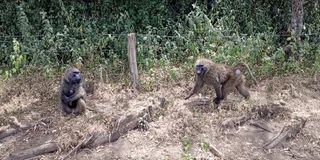Visirani vya Nyani: The sexist baboons of Nakuru city

Two baboons watch from a distance after being chased away by residents in Free Area estate on February 29, 2024.
At 10 years old, I marvelled at the sight of baboons.
All I knew of the baboons was their interesting playful nature and their fondness for bananas and tropical sweets; good old days.
However, a decade later, I got to engage with locals living next to the park and the lovely stories I had to tell of baboons were contrary to their experience.
To them, their experience was smeared with detest towards these wild animals for the expensive damage they cause and physical injuries inflicted to them by baboons.
Surprisingly, a resident from Lake View, Ann Nyambura, who runs a food Kiosk noted that baboons do not fear women.

Ann Nyambura at her food kiosk in Lake view estate.
Curious to understand what she meant, I camped at her shop for several hours, and at any instant she tried to chase the baboons; it was all in vain.
Those who came to her aid were male boda-boda riders close to her shop, who helped her chase them away to prevent them from stealing food stuff at the kiosk.
“I have lived in Lake View for more than eight years and this has been our fate as women, relying on men to come to our aid when baboons strike. They just sneak up on me and run away with something from the shop if I am not alert. This has made me register losses in my business for over years. They mostly steal bananas and and mandazi,” says Wangui
Another resident, Peter Osore, has had to stay close to home to help his wife in running their shop, since baboon attacks have become chaotic in Lake View.

Peter Osore together with Mtaa Wangu writer Purity Kinuthia during an interview in Lake View estate.
“Men have proven to be very reliable in this estate. We help children cross areas that baboons are and help women when baboons attempt to attack them. I would say men living in areas that border the park play the role of protectors,” says Osore.
Echoing her sentiments, Kenya Wildlife Service County Warden, Cheruiyot Chepkwony, says that Baboons can discern between the male and female gender.

County warden Cheruiyot Chepkwony.
“Baboons think like humans and that's why they can tell between a man and a woman. Owing to this, they tend to view the woman as someone who might be defenceless, promoting them to charge and attack. For this reason, we have witnessed more attacks on women than men,” he says
According to the KWS warden baboons are not violent, but only attack to defend themselves.
“Over the years, as they have been introduced to other foods in the residential areas, they are more likely to attack people and steal food from them as they get to feed on different foods at waste disposal sites,” Mr Chepkwony clarifies.
According to the National Institute of Health, Baboons give birth to a single young one after a gestation period of 165 - 185 days .
Across town, in Free Area, Susan Nguro, says that she had had to bear with baboon invasions at her shop where she sells water.

Susan Nguro holding a catapult which she uses to chase away baboons in her Free area home.
“Baboons are very notorious, if they see a lady having a head wrap, they will just go on and steal things without any fear. However, if a man shows up, they are scared,” she says.
Ms. Nguro says that male baboons are the most notorious. She notes that they are courageous enough to charge at women and children snatching food stuff.
“In other instances, baboons never aim to attack people. However, whenever they clash over territories, people may be attacked since they are violent at the moment and out of order,” she concludes.
